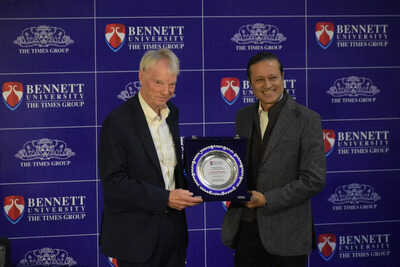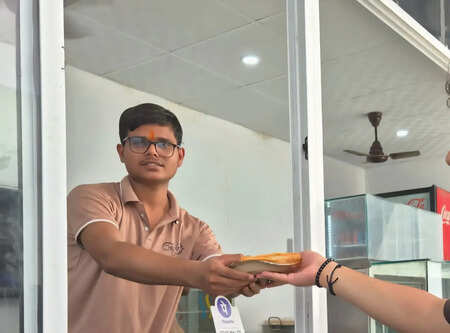Economics Nobel Laureate & INET leaders visit Bennett
Times of Bennett | Updated: Feb 12, 2024 21:46

By PRANAVI AMBATI
Greater Noida: Prof. A. Michael Spence, the 2001 Nobel Laureate in Economic Sciences for his study on market asymmetry, gracedBennett University and engaged in an informative panel discussion that left students in awe of his distinguished work. This occurred a day after his appearance as a guest at the ET Now Global Business Summit in New Delhi.
Canadian Economist Rohinton P. Medhora, Chairman of the New York-based non-profit Think Tank ‘Institute for New Economic Thinking’ (INET), and its President, Prof. Rob Johnson, were also part of the panel, sharing their economic perspectives and views. The session was moderated by Ajaya Sharma, Senior Editor-Markets at ET Now.
Bennett University Chancellor and The Times Group MD Mr. Vineet Jain, Times Group Board of Director Ms. Revati Jain, and INET’s South Asia Director of Strategic Planning Sunanda Nair-Bidkar too were in attendance, having facilitated this prestigious event for the young scholars at Bennett University whose interests lie in trade, finance and the new economic order.
Bennett University Pro Vice-Chancellor Prof. (Dr.) Ajith Abraham started the event with a welcome address, announcing the line-up of speakers and their admirable accomplishments. He invited Prof. Spence to address the attendees, which comprised students, faculty, and deans across the various schools at Bennett University.
“India’s rapid development will very likely thwart any eastward expansion of the new economic order that began to shift from Europe to the East due to developments in nations such as Taiwan,” said Prof. Spence, addressing India’s emergence as the digital economy with the best fintech architecture.
 Prof. Spence addressing the audience at Bennett University, The Times Group on the new economic order and the opportunities with emergent technology. Photo Courtesy: Kamakshi Jagdish Deshmukh.
Prof. Spence addressing the audience at Bennett University, The Times Group on the new economic order and the opportunities with emergent technology. Photo Courtesy: Kamakshi Jagdish Deshmukh.
“The only speed breaker to thisIMF projected growth rate of 7% would be economic shocks in the form of another pandemic or adverse climate change, which will disrupt the supply chain,” he added, stressing the need for diversification of the logistics network.
The real challenge, thereby, according to Prof. Spence, lies in taking advantage of opportunities by developing appropriate countermeasures.
PANEL ADDRESSESINFLATION , NEW TECHNOLOGY AND REGULATION
Elaborating on the need for supply chain diversification, Prof. Spence contrasted the restraints faced by markets across industries after the pandemic. “For the longest time, economies across the globe were deflationary. Post-pandemic, people’s recognition of needs was enhanced, and we thus find ourselves in inflationary economies faced with supply constraints,” he explained.
 Panel comprising (from left to right) Moderator Ajaya Sharma, Prof. Rob Johnson, Prof. Rohinton Medhora and Prof. A Michael Spence. Photo Courtesy: Kamakshi Jagdish Deshmukh.
Panel comprising (from left to right) Moderator Ajaya Sharma, Prof. Rob Johnson, Prof. Rohinton Medhora and Prof. A Michael Spence. Photo Courtesy: Kamakshi Jagdish Deshmukh.
Here, INET Chairman Prof. Medhora stressed the avenue of opportunities given the rise of new technology such as Generative AI. “Today, the source of wealth is locked in intangible properties. Small and Medium enterprises can accelerate their growth by foraying into this market, wherein the variable costs are low.” He also highlighted the role of the government as the only entity capable of levelling the playing field, given the limits of self-regulation.
The panel also addressed questions posed by members of the audience. In one such response, Prof. Rob Johnson discussed the Office on Migration and commented on how India is seen by the emerging markets in Africa as the exporter of vision, given its growth over the last decade.
POIGNANT TAKEAWAYS
During the exchange, in addition to sharing economic insights, the panel also shared some poignant thoughts. “Humility is a must since you know you can never be too certain,” elucidated Prof. Spence.
Equally resounding was Prof. Rob’s message to the audience, which stemmed from belonging to a family of physicians. His quip, “Diagnosis precedes remedy,” earned the audience’s cheer.
(The writer is a Semester 4 student of the BA Journalism and Mass Communication programme.)
Greater Noida: Prof. A. Michael Spence, the 2001 Nobel Laureate in Economic Sciences for his study on market asymmetry, graced
Canadian Economist Rohinton P. Medhora, Chairman of the New York-based non-profit Think Tank ‘Institute for New Economic Thinking’ (INET), and its President, Prof. Rob Johnson, were also part of the panel, sharing their economic perspectives and views. The session was moderated by Ajaya Sharma, Senior Editor-Markets at ET Now.
Bennett University Pro Vice-Chancellor Prof. (Dr.) Ajith Abraham started the event with a welcome address, announcing the line-up of speakers and their admirable accomplishments. He invited Prof. Spence to address the attendees, which comprised students, faculty, and deans across the various schools at Bennett University.
“India’s rapid development will very likely thwart any eastward expansion of the new economic order that began to shift from Europe to the East due to developments in nations such as Taiwan,” said Prof. Spence, addressing India’s emergence as the digital economy with the best fintech architecture.

“The only speed breaker to this
The real challenge, thereby, according to Prof. Spence, lies in taking advantage of opportunities by developing appropriate countermeasures.
PANEL ADDRESSES
Elaborating on the need for supply chain diversification, Prof. Spence contrasted the restraints faced by markets across industries after the pandemic. “For the longest time, economies across the globe were deflationary. Post-pandemic, people’s recognition of needs was enhanced, and we thus find ourselves in inflationary economies faced with supply constraints,” he explained.

Here, INET Chairman Prof. Medhora stressed the avenue of opportunities given the rise of new technology such as Generative AI. “Today, the source of wealth is locked in intangible properties. Small and Medium enterprises can accelerate their growth by foraying into this market, wherein the variable costs are low.” He also highlighted the role of the government as the only entity capable of levelling the playing field, given the limits of self-regulation.
The panel also addressed questions posed by members of the audience. In one such response, Prof. Rob Johnson discussed the Office on Migration and commented on how India is seen by the emerging markets in Africa as the exporter of vision, given its growth over the last decade.
POIGNANT TAKEAWAYS
During the exchange, in addition to sharing economic insights, the panel also shared some poignant thoughts. “Humility is a must since you know you can never be too certain,” elucidated Prof. Spence.
Equally resounding was Prof. Rob’s message to the audience, which stemmed from belonging to a family of physicians. His quip, “Diagnosis precedes remedy,” earned the audience’s cheer.
(The writer is a Semester 4 student of the BA Journalism and Mass Communication programme.)







